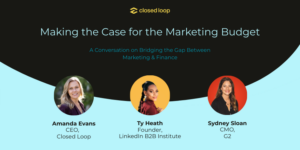
The Budget’s on the Line. How CMOs Are Winning the CFO Conversation
Learn how leading CMOs are reframing marketing to speak the CFO’s language, drive predictable outcomes, and secure their budgets in 2025 and beyond.
Partnering with a digital advertising agency is a consequential decision that requires thorough vetting and careful consideration. After all, you’ll rely on the agency partner you choose for strategy, execution and measurement as you work to achieve key business and growth goals.
So, what should you ask during the vetting process to ensure the agency is the right partner for your business? In this article, we’ll discuss nine essential questions CMOs should ask a potential agency partner—covering angles ranging from reporting systems to client turnover to team makeup.
Lead with this question to learn what the agency prioritizes and how the team measures success for clients. You’ll want to know what the team optimizes toward for clients in your niche or industry.
Prompt the agency to explain both what the team measures and why they measure it. This way, you can confirm that the metrics tie directly to business outcomes, not vanity purposes.
Don’t just take the agency’s word for it. Andrea Denk, Closed Loop’s VP of Marketing, recommends asking for 2-3 sample reports so you can see exactly what to expect.
Some agencies provide custom reporting to offer added value and create a competitive advantage. Custom solutions often offer unique insights, which can also give your company an advantage.
At Closed Loop, we provide clients with Forager, our proprietary data solution. Forager is designed to bring client data sources together, tell a cohesive story and drive your business forward.
In some cases, these custom solutions increase the cost of your relationship in ways you might not expect. Caille O’Leary, Closed Loop’s Business Intelligence Director, recommends confirming whether there are additional costs associated with customization or new dashboard and report requests.
It’s important to note that out-of-the-box solutions may be perfectly adequate in some situations. They typically cost less, but they provide the same insights you could get from any other agency.
Not all data reporting solutions are created equal. Does the agency provide real-time data? Or does the team’s reporting solution update every few minutes or every hour?
O’Leary also suggests asking for specifics about data delivery. For example, will you have self-serve access so you can review it at your convenience? Or will the agency provide reporting on a preset timeline?
When you hire an agency partner, you entrust the team with a tremendous amount of information. As a result, you have to be confident that the team has appropriate security measures in place.
O’Leary recommends asking any potential agency partner how you can be sure the data you’re sharing will be securely handled and stored. What security framework or policy does the agency have?
Keep in mind that data loss and leaks are just two potential data challenges you may encounter. In some cases, data mismanagement may mean your company can’t access certain advertising features.
Many agencies have adopted AI-powered business intelligence tools to process advertising data efficiently. When done well, these tools can share timely insights and suggest high-impact adjustments to ad campaigns.
However, any agency partner you choose shouldn’t rely completely on AI-powered analysis. Instead, aim to partner with an agency that provides human oversight and adds nuance to any AI insights.
The length of time clients stay with the agency speaks volumes about the quality of the agency’s work and the caliber of the results the team generates. At Closed Loop, we’re proud to have an average client tenure of 5.5 years.
Ideally, you want to partner with an agency with a low churn rate and a long client tenure. However, the agency’s business model may affect these numbers.
As a general rule, a client turnover rate of no more than 20 percent is a good sign for a retainer-based agency. For a project-based agency, a client turnover rate of 30 to 50 percent is more realistic.
It’s easy to focus on client retention metrics and neglect to ask about employee turnover. However, it’s just as crucial to know how stable your team would be and how long you could expect to work with the same team members.
“The first year with a new agency is the most critical time for a new partnership,” Denk cautions. “It’s important to understand if the team that works on your account has a low or high likelihood of turnover.”
At Closed Loop, our average employee tenure is 6 years. Because our turnover rate is quite low, we provide more stability, which often translates to more efficient campaigns.
For much of the digital advertising industry, turnover tends to be much higher. The average employee turnover rate for ad agencies is 26.8%.
Many digital advertising agencies assign anywhere from four to eight accounts to each ad manager. In some cases, that number can climb into the double digits.
A talented ad manager may be able to handle that many accounts. But the more accounts they take responsibility for, the more they have to break up their time. As a result, overly busy ad managers may be spread too thin to service accounts adequately.
At Closed Loop, our ad managers have an average of 1.4 clients each. This relatively low client load allows each ad manager to devote substantial time and resources to each account.
Last but certainly not least, make sure you know who will manage your account. “Understanding the makeup of the entire team assigned to your account is critical,” Denk explains.
First, find out if a single person will be responsible for your account or if you’ll have a specialist handling each channel. Either way, Denk recommends asking how much experience each person has.
“Experience matters. But are they true masters of the digital world? Are they following best practices from years ago, or are they keeping up to date with everything as it happens in real time? Are they leveraging lessons learned from a cohort that looks like your company?”
You’ll also want to know who will handle strategy for your account and who will handle execution. If another team member is responsible for reporting, you’ll want to know that, too.
Denk suggests asking if your account will have a dedicated analyst. It’s also important to know who you’ll contact with urgent issues so you can get assistance with troubleshooting or data discrepancies.
The answers to all of these questions can help you determine if the potential partner is a great sales agency—or a genuinely good digital agency and the right choice for your business.
For CMOs, choosing the ideal agency partner can be daunting. But by asking the right questions, you can identify the best agency to partner with your team and drive your company forward.
Curious if we’re a good fit for your needs? Contact Closed Loop to connect with our team.

Learn how leading CMOs are reframing marketing to speak the CFO’s language, drive predictable outcomes, and secure their budgets in 2025 and beyond.
Running campaigns without Offline Conversion Tracking is like fishing blind—uncertain and inefficient. Learn how OCT connects CRM data to ad platforms, helping CMOs optimize for real business impact, from quality leads to closed deals.

The B2B landscape is relentless, and mediocre video production won’t cut it. Learn why scaling high-quality video production is essential to drive ROI, stand out, and stay competitive in today’s paid media game.